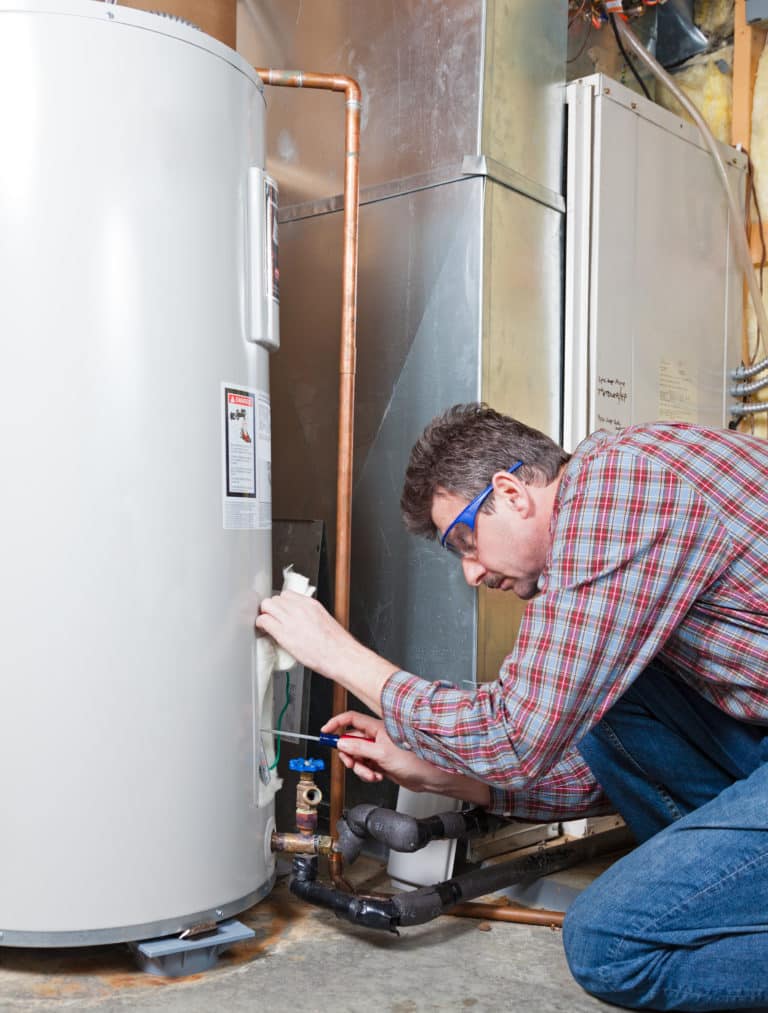
There are many different water heater types. When it comes time to replace the water heater in your home, you may want to consider expanding beyond the original water heater of your home. Understanding the different types of water heaters can go a long way toward helping you to make the best decision for your building and your specific needs. There are a multitude of considerations that must be taken into account when you decide on a new water heater for your home, from the type of fuel that it uses to the required water heater maintenance and installation costs. Regardless of the type of water heater that you have, it will require regular maintenance. Here at S & B Plumbing, we strive to provide superior, high-quality water heater maintenance to ensure that your water heater lasts for as long as possible.
Heat Pump Water Heaters
Heat pump water heaters are often referred to as “hybrid” water heaters. This is because they use electricity to heat water, but in a manner that minimizes the total energy expenses. They use the heat from the air or ground to heat the water in their tank. The electricity is intended to move the heat, not to generate the heat, which means that it requires far less electrical energy. However, despite its energy-efficiency, a heat pump water heater doesn’t function effectively in cold places. They also require a significant amount of room, as they are larger water heaters. They come at an expensive initial cost, as well. Since they hold water in a tank, they should be cleaned regularly, approximately twice a year to prevent build up and keep them in good repair.
Electric Tankless Water Heaters
Electric tankless water heaters are, as the name would state, the only water heater option that doesn’t feature a tank to hold the water. It heats the water as it becomes necessary through the use of super-heated coils. These water heaters heat water quickly with the use of either electricity or natural gas. The availability of these types of fuel may require modifications to be made to the home, which can result in incredibly expensive costs. However, since they don’t require a tank, they only need to be cleaned about once a year. These kinds of water heaters generally last from 8-10 years. They are energy efficient because they only heat the water as needed, rather than keeping water heated for a prolonged period of time. The energy-efficiency saves money on your energy bill, which can help to offset the higher initial expense of electric tankless water heaters.
Conventional Storage Water Heaters
Conventional storage water heaters are the most popular and frequently used water heater type. They have a tank that holds the water that needs to be heated. The tank is insulated, which helps to keep the water heated without consuming excessive amounts of energy. This water heater uses two valves to keep the water at an appropriate temperature and pressure. These valves are a temperature control valve and a pressure control valve. These valves open when temperature or pressure within the tank becomes too high.
As with any water heater that includes a tank, it must be cleaned at least twice a year to ensure that it remains in good condition. These water heater types are affordable, have easy installation, and last around 12 years. The downside of these water heaters is that the capacity of the water tank is the amount of hot water that is available. It can be a lengthy process for the new tank of water to fill and heat.
Solar Water Heaters
Solar water heaters require solar panels to be mounted on the roof of the building. This method can be incredibly effective for homes that are located in sunny, warm climates. These water heaters are likely the most energy-efficient, environmentally-friendly water heater types. They generally have far lower energy expenses, but they are much more expensive to install initially. It can take years to see a positive return on investment with solar water heaters, though they are much better for the environment.
Solar water heaters use tanks. This means that they need to be cleaned about twice a year. They also require solar panel maintenance, which can lead to increased maintenance expenses. It is important to keep in mind that solar water heaters often require a backup method for heating water to guarantee that hot water is available in the home, even on a cloudy day.
Best Water Heater Types
The best water heater type for your home will depend on an array of factors. When you consider a new water heater, you need to consider the type of fuel that the water heater uses, as well as its availability and applicable expenses. Water heaters can run on electricity, fuel oil, natural gas, solar energy, propane, and geothermal energy. The availability of these types of fuel will fluctuate based on your location.
You will also want to consider the size of the water heater. A tankless water heater will require less room than a heat pump water heater. The energy efficiency, operating costs, and initial installation costs are all necessary considerations. Less initially expensive water heaters often cost more money in operating costs and energy expenses over time, so you will need to weigh the options carefully before making a decision.
The water heater type that you choose for your home will depend on all of these different circumstances. Ensuring that you obtain the best water heater for your needs will go a long way toward minimizing your energy expenses and ensuring that hot water is consistently available and the water heater heats as effectively as possible. Once you have determined the best water heater for your needs, it will be necessary to receive regular maintenance on your water heater to keep it in functioning condition. A water heater that doesn’t receive the necessary maintenance is likely to spring leaks, build-up pollutants, and ineffectively heat water. To learn more about water heater maintenance, contact our experts at S & B Plumbing today!
